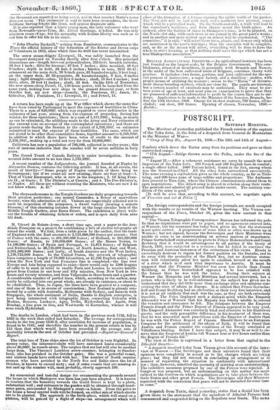The foreign correspondents and the foreign journals are much occupied
with the results or no results of the Warsaw meeting. The Vienna oor- respondent of the Times, October 30, gives the view current in that Capital- " The Vienna Telegraphic Correspondence Bureau has informed the pub- lic that no stipulations were put to paper, and no agreement entered into, at Warsaw, but the assurance has today been given me that the statement is not quite correct. A programme of some kind or other was drawn up at Warsaw ; but not signed, because the Sovereigns and their Ministers were unable to come to an understanding on several matters of importance. Prince Gortschakoff endeavoured to prove to Prince Hohenzollern and Count Rechberg that it would be advantageous to all parties if the treaty of March, 1856, were subjected to a revision ; but he failed to convince the
i Prussn and Austrian statesmen of the correctness of his views. Russia is exceedingly desirous to regain her former position on the Danube, and to do away with the neutrality of the Black Sea, but no Austrian states- man will voluntarily allow her again to establish herself at the mouth of a river which is of such vital importance to Austria. It must be supposed that the Prussian Minister was even less docile than Count Rechberg, as Prince Gortschakoff appeared to be less satisfied with the former than he was with the latter. During their sojourn at Warsaw the Monarchs and their Ministers had several interviews, but a person who is likely to be well-informed on the subject has given me to understand that they did little more than exchange ideas and opinions cons cerning the state of affairs in Europe. It is related that Prince Gortscha- koff and Count Rechberg had an altercation at their very first interview, and it is not at all unlikely that such was the ease, as they are both extremely irascible. The Poles displayed such a disloyal spirit while the Emperor Alexander was at Warsaw that his Majesty was totally unable to conceal the vexation and annoyance he felt. The relations between the Emperor Francis Joseph and the Prince Regent of Prussia appeared to be very good. The Emperor Alexander was extremely kind and attentive to his illustrious guests, and the only perceptible difference in his treatment of them was, that he was somewhat more punctilious with the Emperor of Austria than he was with the Prince Regent of Prussia. Should there be an European Congress for the settlement of the affairs of Italy, it will be found that Austria and Prussia consider the conditions of. the Treaty concluded at Villafranca bindiug. Before I leave this subject, it may be as well to ob- serve that the Emperoraf Austria left Warsaw four or five hours earlier than the Regeut of Prussia did." The view at Berlin is expressed in a letter from that capital to the Elberfeld Gazette- " A despatch received today from Vienna gives this account, of the inter- view at Warsaw :—Tho Sovereigns and their ministers found that their opinione were completely in accord as to the changes which are taking place; but they did not succeed in concluding an international as to an mner of regulating the situation in conformity with nternational law ; they, however, admitted the necessity of arriving atan understanding. The collective measures proposed by one of the Powers were rejected. A Congrk as wee proposed, but an understanding on this matter was made subject to the reserves on which negotiations are to take place between the three State; and other great Powers. The Sovereigns and their Ministers separated with the conviction that peace will not be disturbed for some tune to come."


























 Previous page
Previous page